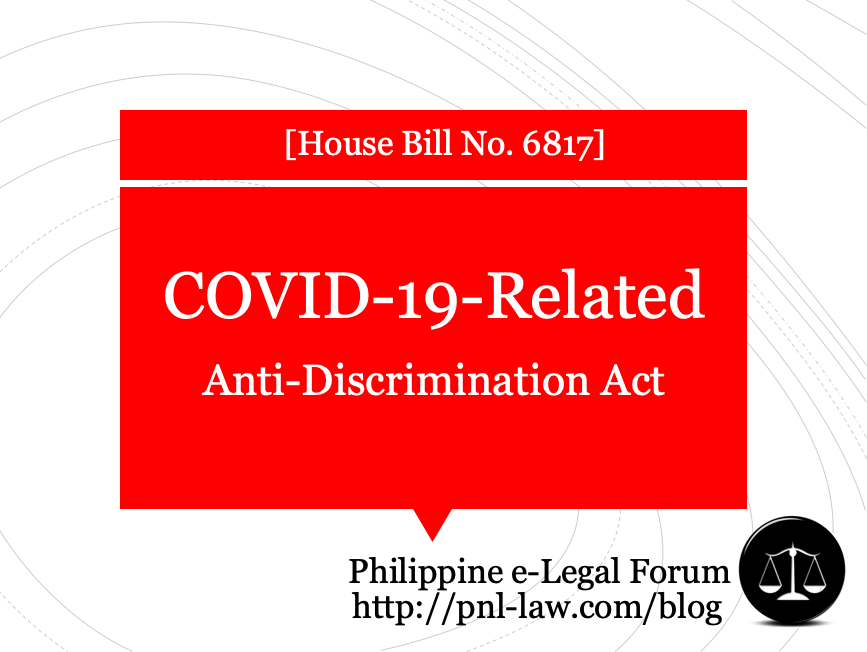On 27 May 2020, the House of Representatives approved on second reading House Bill No. 6817, which proposes “An Act Prohibiting the Discrimination Against Persons who are Declared Confirmed, Suspect, Probably, and Recovered Cases of COVID-19, Repatriated Filipinos, Healthcare Workers, Responders, and Service Workers and Providing Penalties for Violation Thereof”. The short title is “COVID-19-Related Anti-Discrimination Act.”

DISCRIMINATORY ACTS
Discrimination, as defined in the proposed law, generally refers to any act of unjust distinction, exclusion, or restriction which has the effect of impairing or nullifying the recognition, enjoyment, and exercise on an equal footing, of human rights and fundamental freedoms in the political, economic, social, cultural, civil, or any filed of the public life of a person, or which tends to have the effect of endangering the person’s life, safety and security. The following offenses are defined and penalized in the proposed law:
- (a) Failure to give assistance. No public official, healthcare worker, or healthcare institution shall refuse, fail, or neglect to give assistance to persons who are declared confirmed, suspect and probable cases of COVID-19 or any person suspected of having been exposed to and has recovered from COVID-19, including overseas Filipino workers, registered or otherwise.
- (b) Harassment or Assault. No person may verbally, physically, or psychologically harass, threaten or assault persons who are declared confirmed, suspect and probable cases of COVID-19, COVID-19 survivors, or any person suspected of having been exposed to COVID-19, repatriated OFWs, responders or service workers, or any of the covered individuals.
- (c) Stigmatization. No person shall publicly disclose, with the intent of exclusion, harm and discrimination, in social media and other information platforms, that a person is declared a confirmed, suspect and probable case of COVID-19 or has recovered from COVID-19, whether or not the same has been confirmed or validated from the list given by authorized health officials and agencies.
- (d) Unlawful refusal to honor valid and existing contracts. No person may unlawfully refuse to honor any valid and existing contract on the basis of COVID-19. This includes contracts of lease.
COVERED INDIVIDUALS
The proposed law seeks to protect the following individuals:
- Confirmed cases – persons who tested positive for COVID-19.
- Essential and frontline workers – persons who are engaged in, or employed by essential services, as defined in laws, rules, orders and resolutions.
- Healthcare workers – persons who deliver health-related service or care which include physicians, nurses, hospital and clinic aides, barangay health workers, paramedics, emergency medical technician, ambulance drivers and staff, laboratory technicians, and those who provide related or support service in hospitals, clinics, quarantine centers, and other health facilities.
- Probable cases – persons with mild, severe, or critical symptoms whose test COVID-19 results are inconclusive as defined by the DOH.
- Recovered cases – persons who tested negative to COVID-19 after treatment and declared as such by the DOH.
- Repatriated overseas Filipino workers, whether land or sea-based, registered or otherwise. These are citizens of the Philippines working abroad including Overseas Filipino Workers (OFWs) who return to the Philippines, for reasons which include completion of projects, labor conflicts, medical causes, psychosocial problems, restricting immigration policies, wars, and other similar calamities. The term also includes the remains of Filipinos brought back to the Philippines.
- Responders – officers, members, and employees of the police and armed forces, city and barangay offices, the local Department of Public Order and Safety, Disaster Risk Reduction and Management Office, Barangay Health Emergency Response Team, Epidemiology and Disease Surveillance Unit, and other government employees deployed directly or indirectly to respond to COVID-19 related situations, or who perform functions that may cause potential exposure to COVID-19.
- Service workers – persons who work in public or private establishments for essential services, which include food, water, banking and finance, utilities, medicine, security, and maintenance and sanitation, and those who provide services under circumstances with high risk of exposure to COVID-19, which include administrative, security, maintenance and staff support to health and quarantine facilities.
- Stranded individuals – persons traveling form one local government unit to another
- Suspect cases – individuals who show symptoms of influenza-like illness such as fever, tiredness and dry cough, those with travel history abroad and to areas with confirmed local transmission of COVID-19, and those with exposure to a confirmed case as defined by the DOH.
The list of protected individuals includes “recognized volunteers,” but the term is not defined in the proposed law.
PENALTIES: IMPRISONMENT
The imposable penalty for those who commit harassment or assault against the covered individuals is imprisonment ranging from 1 year to 10 years, or a fine, or both imprisonment and fine.
Those who commit the other offenses may be imprisoned for a period ranging from 6 months to 5 years.

hello,
I applied for a loan in one of the loaning website in phils, cashmart online and it was before the start of the pandemic, I was npt able to pay it because we were no work no pay by that time and even now just relying on working onsite risking myself to work 1 to 2 times a week.
and now they want me to. pay 46k even if I only borrowed 14k that time and they are haraasing me i just wanted to know what are my rights